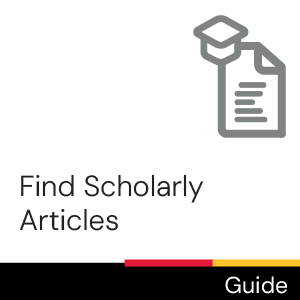Time commitment
Less than 2 minutes
Description
This video will describe the difference between articles, journals and databases to help you better understand what you're searching.
Video
Transcript
[Upbeat background music plays throughout.]
Articles, Journals, and Databases: What's the difference??
Knowing the difference between articles, journals and databases can help you search efficiently and cite correctly. This video will explore the differences between these 3 different resources.
Researchers often write scholarly articles to document the findings of their research.
[The first page of a scholarly journal article appears. The article title is “The evaluation of mixing methods in HYSPLIT using measurements from controlled tracer experiments” and it is published in the journal Atmospheric Environment. The author names, abstract, and publisher (Elsevier) appear. The page consists mostly of text and appears to be technical in nature.]
One of the main ways researchers share their findings is by publishing their articles in scholarly journals.
[The cover of an issue of the scholarly journal Atmospheric Environment appears alongside the journal article. The journal article moves towards and disappears into the scholarly journal.]
These journals are like magazines, but are collections for scholarly, not popular, writing. Similar to magazines, scholarly journals often have a focus. Just as a magazine might focus on current events, a scholarly journal might focus on environmental science.
[The cover of an issue of TIME magazine appears alongside the scholarly journal.]
Just like how you can find many different magazines that publish on current events, there are many journals published on the same or similar topics.
[Covers for The Nation, the New Yorker, and Maclean’s appear under the TIME magazine cover. Then, covers for the journals Ecology, Advances in Ecological Research, and Biodiversity Informatics appear under the Atmospheric Environment cover.]
The University of Guelph library provides you access to over 55,000 scholarly journals! Searching for articles within each journal one by one would take a really long time.
This is where databases come in! To increase the likelihood that people will read the articles published in journals, journal publishers often make their articles searchable through databases.
[Covers for the scholarly journals Atmospheric Environment and Ecology appear side by side. The front pages of three different journals articles emerge from each of them. The search interface for the database Agricola appears. The journal articles move towards and disappear into the Agricola search interface.]
When you type words into a database, the database scans the text of articles from numerous journals at once. Some databases are able to scan the whole text, others only scan portions such as the title or the abstract. Some databases can search for your words in the articles of hundreds of journals! So, instead of having to search journal after journal looking for articles on your topic, you can search the articles of multiple journals at once using a database.
[The words “environmental science” are typed into the search box. The front pages of three different journal articles appear under the Agricola search interface, and a red line passes over them, giving the impression of the text being scanned through.]
There is no database out there that is able to search every journal at once, so researchers often consult more than one database.
[The covers of the scholarly journals Ecology, Advances in Ecological Research, and Biodiversity Informatics appear below the Agricola search interface with arrow pointing to each of them, indictating that they can be searched via Agricola. A fourth cover for the Canadian Journal of History appears with an X through it, indicating that it is cannot be searched via Agricola.]
Like journals, databases are usually topic specific. The Library has hundreds of subject-specific databases.
[Search interfaces for the following databases appear in turn: Agricola, Web of Science, Scholars Portal Dataverse, Biological Science Collection, and CAB Direct.]
In addition, ProQuest and EBSCOhost are commonly known database platforms. They are not databases themselves, but are tools that allow you to search multiple databases at once, broadening your search.
[Search interfaces for the ProQuest and EBSCOhost platforms appear. Next, search interfaces for several other databases appear below.]
Omni, which is the Library’s search engine, is an example of another tool that can search more than one database at a time. Omni is different than other database platforms because it is not always clear which databases are included in the search.
[The Omni search interface appears alongside search interfaces for the Biological Science Collection, Web of Science, and Agricola.]
To review: Articles are the documents that researchers write detailing their findings. Journals publish collections of articles on a specific topic. Databases provide access to multiple journals at once. Lastly, database platforms allow access to multiple databases.
Have questions? Ask Us.
[Need help? library@uoguelph.ca]
[Facebook /McLaughlinLibrary. Snapchat, Instagram and Twitter @uglibrary.]
[For more information about our services, and what we're offering this semester, visit our website: www.lib.uoguelph.ca.
To get up-to-date information about workshops and events, follow us on social.
Twitter - https://twitter.com/uglibrary
Instagram - https://www.instagram.com/uglibrary/
Facebook - https://www.facebook.com/McLaughlinLibrary/
License

This work is licensed under a Creative Commons Attribution-NonCommercial-ShareAlike 4.0 International License.

